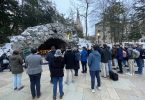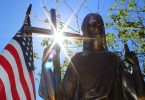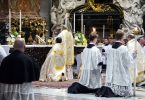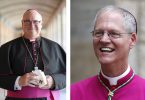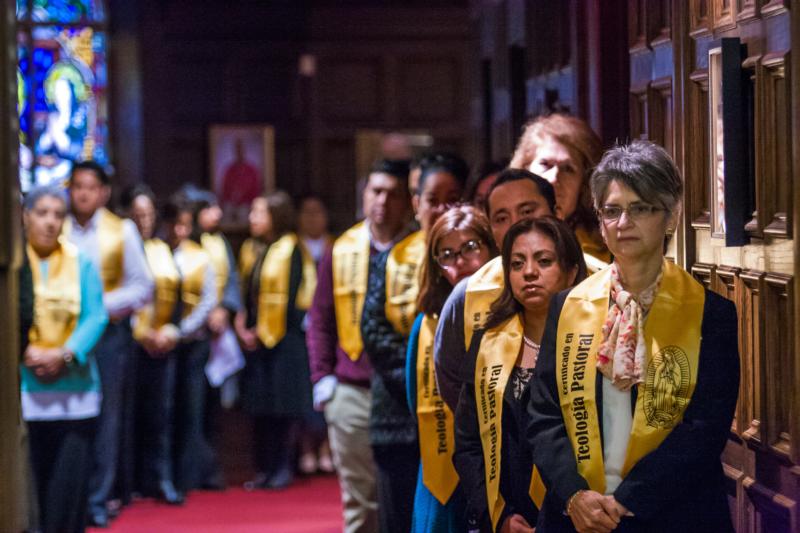
Students receiving a pastoral theology certificate in Spanish line up before Mass and a graduation ceremony Jan. 9 at Holy Spirit Church in Atlanta. Some 60 Spanish-speaking catechists from 30 parishes participated in the three-year program, which was offered online through the University of Dallas. (CNS photo/Thomas Spink, Georgia Bulletin)
By Priscilla Greear
ATLANTA (CNS) — The first class of 60 students from the Archdiocese of Atlanta has completed a three-year formation program in Spanish through the University of Dallas, earning a pastoral theology certificate.
In a recent graduation ceremony at Holy Spirit Church, Atlanta Auxiliary Bishop Luis R. Zarama sent forth the Spanish-speaking church leaders to catechize and evangelize the faithful from Gainesville to Jonesboro and fortify Hispanic ministries across the archdiocese.
The online program aims to form leaders and strengthen the Spanish catechetical foundation in the Church of the archdiocese where 68 of 100 parishes offer Mass in Spanish and nearly half — 44 percent — of Catholics are Hispanic.
A second class of 70 students will complete studies this December. Registration will open in April for the third class to begin this fall.
“This program has really made a difference in reaching out to the leaders in the diocese. It has provided this formation for them and raised awareness of the importance of forming these Hispanic leaders,” said program coordinator Monica Oppermann of the Atlanta archdiocesan Office of Formation and Discipleship.
“Our mission is to equip parish leaders for ministry. This program has fulfilled the mission in equipping them with formation and resources and networking with each other.”
In the fall and spring semesters, students took two theological classes and one pastoral course over 15 weeks, watching a weekly video lecture at their convenience and completing assignments, tests and quizzes with online communication with professors. The certificate in pastoral theology is comprehensive but less demanding than a degree program. It meets study requirements for master catechist certification. The workload for the graduating class included 90 weeks of study, 18 books and 90 discussion forums, videos and exams.
A professor from the Catholic-run University of Dallas kicked off each semester with a class at the archdiocesan chancery in Smyrna where students received books from Spanish publishers. Class members were also divided geographically into smaller groups to meet for study and prayer.
“We formed them and we connected them and the teachers interacted with them,” Oppermann told The Georgia Bulletin, Atlanta’s archdiocesan newspaper.
The students, ranging from Mexican and Central American immigrants to second-generation Americans of Hispanic descent, hailed from 30 parishes. The archdiocese offered two scholarships per parish for members nominated by the pastor; the parish paid 30 percent, the archdiocese 40 percent, and the students covered the remainder of the $670 annual tuition. Five also participated from the Diocese of Savannah and six paid for themselves as independent participants.
“That partnership was fabulous because students felt affirmed by the pastor, and for the parish, the diocese was affirming them, too. And we are assured it was a good investment because we know whoever was nominated was going to work at the parish,” Oppermann said.
With few online certificate programs in Spanish in the United States, archdiocesan leaders believe this program meets a need in addressing the realities of Hispanic Catholic immigrants in the United States. The archdiocese launched the program in 2013 after planning with the University of Dallas’ School of Ministry to design an online version as an alternative to the on-site program offered by Dallas since 2009.
Oppermann said that the online format was key to attracting leaders from rural parishes who lacked the transportation or the time to attend a Saturday class in Atlanta. The university needed 70 students to make the program financially viable, and 73 originally signed on to set things in motion under the patronage of Our Lady of Guadalupe.
Oppermann commended the students’ perseverance on top of day jobs and ministry service. Their retention rate was 84 percent.
“So many of the Spanish-speaking leaders at the parishes are well-intentioned and might have had some formation, but the formation opportunities are almost non-existent,” she said. “It’s a testimony of how much the Hispanic population is getting integrated into society, into technology, and how much they are willing to give to the church in terms of time.”
Courses range from Scripture and church history to youth and young adult ministry, liturgy, sacraments, prayer and spirituality. Oppermann herself completed the program to learn the content and troubleshoot any problems — such as having a professor replaced who was not engaged.
She contacted students falling behind to give them encouragement and support. Students also received spiritual formation, including a retreat on “lectio divina,” a contemplative reading of Scripture.
At St. Philip Benizi Church in Jonesboro, graduate Danilo Campos Arias serves as a catechist, an extraordinary minister of holy Communion, altar server coordinator and parish council member. During his studies, he and his wife formed a class for catechists to share coursework he was receiving.
“Today it’s a reality, and we work with nearly 20 persons in the planning and implementing of a catechesis program for the Hispanic community. With guidance from the Holy Spirit, this initiative has brought great joy and participation from families in diverse ministries,” he reported.
A native of Costa Rica with a degree in physical education, Arias has lived in Jonesboro since 2001. The program strengthened his faith and resolve to persevere and quieted his anxieties. He now feels a greater sense of responsibility to serve.
“Our gifts and talents must be formed and guided to work most effectively to carry out a mission of evangelization,” said the father of four. “I thank God, the Archdiocese of Atlanta in partnership with the University of Dallas, and my church, St. Philip Benizi, for their support and the opportunity to grow in faith.”

